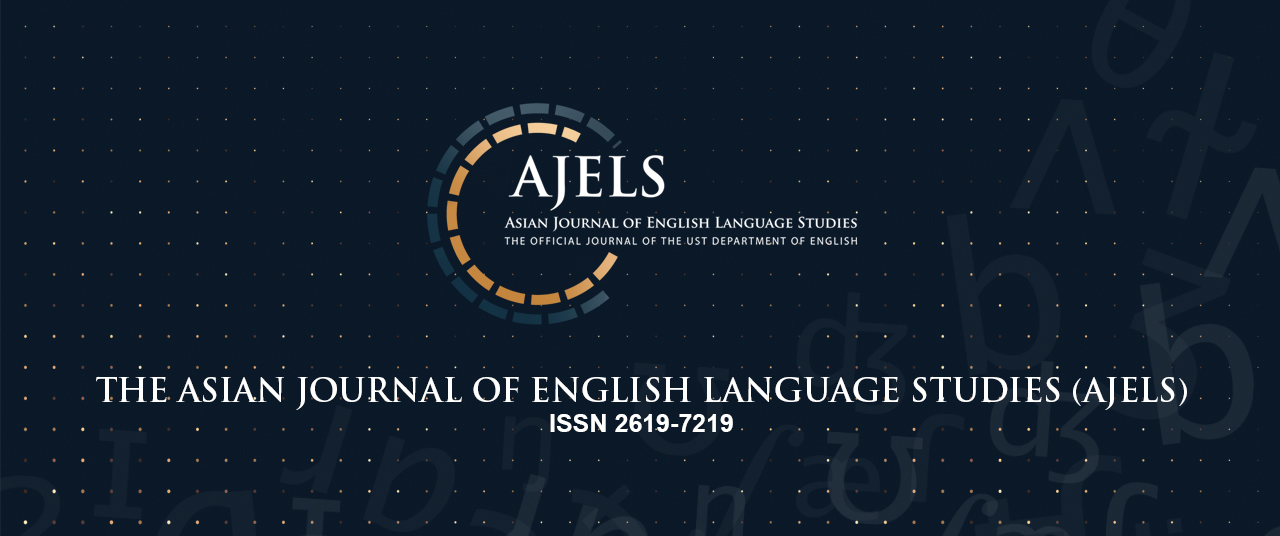EDITORIAL OFFICE
- Department of English General Education Unit, Main Building, University of Santo Tomas, España Boulevard, Sampaloc, Manila, The Philippines
- ajels@ust.edu.ph
ISSN 2619-7219



EBSCOhost Databases
The Asian Journal of English Language Studies (AJELS) is the official journal of the Department of English of the University of Santo Tomas (UST), the oldest university in Asia. It is a peer-reviewed, open-access journal that features current, original research in English language studies and English language teaching and learning either as a second or a foreign language.
AJELS biannually publishes research articles, brief reports, review articles, book reviews, and PhD abstracts in the following areas:
(1) Language and law,
(2) Language, literacy, education, and technology, (3) Language, gender, and inclusivity,
(4) Language, globalization, and the workplace, and
(5) Language, language use, and multilingualism.
As an open-access journal, all articles of AJELS can be downloaded free of charge from its website. Users are allowed to read, download, copy, distribute, print, search, or link to the full texts of the articles, or use them for any other lawful purpose, without asking prior permission from the publisher or the author. This is in accordance with the Budapest Open Access Initiative (BOAI) definition of open access. AJELS is committed to meet the highest standards in research and academic publication. The Journal is guided by the principles stated in the Publication Ethics and Copyright section.
AJELS does not charge any article processing fees
For decades, the university-wide Department of Languages managed disciplines covering English, Filipino, Spanish, and Literature. But in 2010, English was spun off as an independent department under the Faculty of Arts and Letters for the purpose of laying the groundwork for the establishment of an academic program called Bachelor of Arts in English Language Studies (BA-ELS) at the University of Santo Tomas. Corollary to this change, the Asian Journal of English Language Studies was established to create a platform for faculty members, and graduate and undergraduate students to publish their research papers. The publication was intended to support the development of a research culture and, at the same time, promote excellence among the faculty members and students under the Department of English.
The first volume of AJELS was released in October 2013, with Dr. Marilu Rañosa-Madrunio as the founding editor-in-chief. She was supported by the inaugural editorial board composed of Dr. Alejandro S. Bernardo, Mr. Roy Randy Y. Briones, Dr. Veronico N. Tarrayo, and Dr. Camilla J. Vizconde, who was then-chair of the UST Department of English. AJELS was conceptualized with the help of prolific researchers, including Dr. Allan B. De Guzman of UST and 13 scholars from international universities who served as the Journal’s advisory board. Among the supportive advisors of AJELS during its early years were Dr Resty M. Cena (formerly of University of Alberta, Canada), Dr Christopher Conlan (formerly of Curtin University, Western Australia), Dr Azirah Hashim (University of Malaya, Malaysia), Dr Paul Kei Matsuda (Arizona State University, USA), and Dr Ricardo Ma. D. Nolasco (University of the Philippines). With their valuable guidance and the vision and work of the founding editorial team, the journal was officially launched on February 10, 2014. At present, it has in its roster about 30 outstanding academics from reputable institutions around the globe who serve as peer reviewers.
From 2013 to 2017, AJELS was published in print. In 2018, the journal became fully online and open access. To accommodate more articles, AJELS started releasing issues biannually (June and December) in 2024. The shift to online, biannual publication was made possible through the University’s full support.
While the publication is based in the University of Santo Tomas, it welcomes contributions from across the globe, thereby appealing to a wide international readership in the field of linguistics and language education.
Associate Editor
University of Santo Tomas
Manila, Philippines
Language Editor
De La Salle University
National Institute of Education
Nanyang Technological University
Singapore, Singapore
Website Administrator